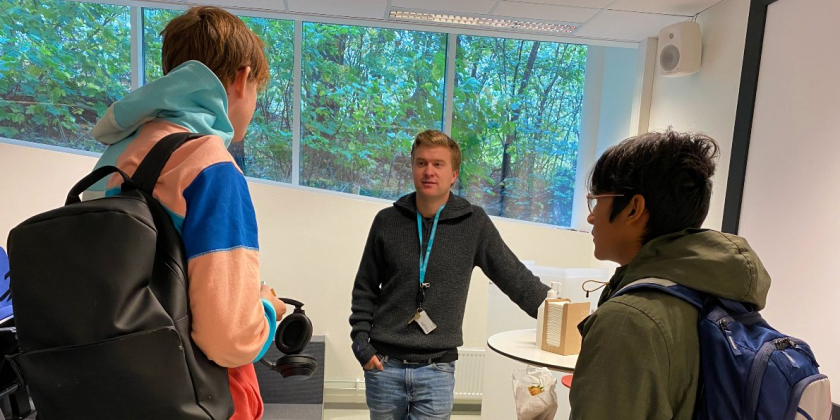First-year students met their mentors
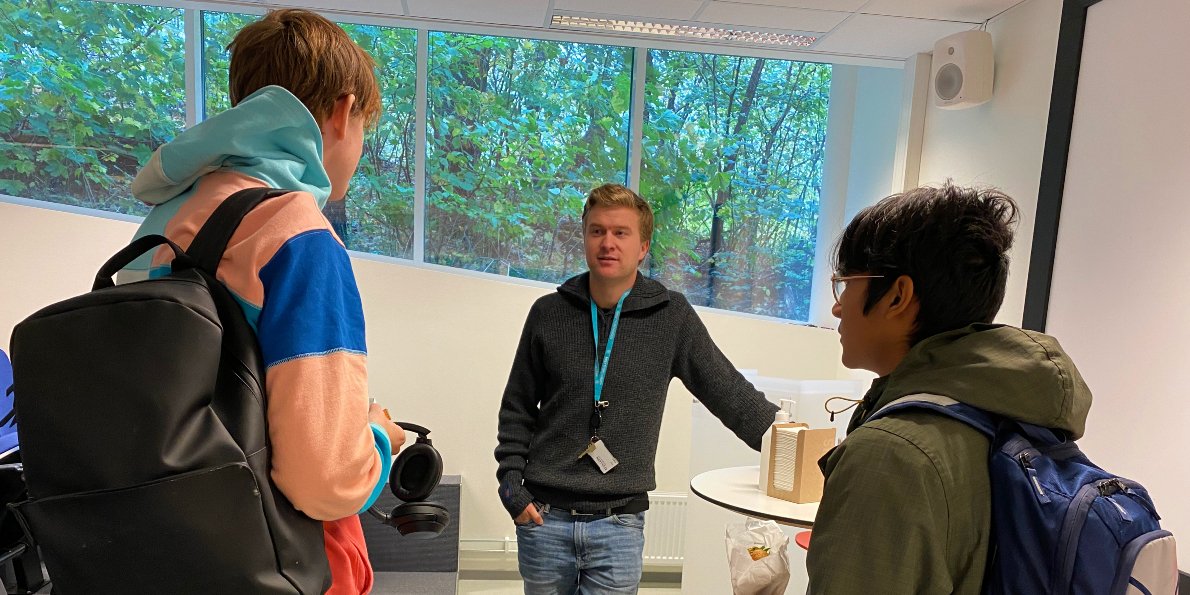
This fall, 32 students have begun their first year of the Researcher Programme at Ullern Upper Secondary School. Earlier in October, they met their four mentors, who will support them throughout the school year – and the mentors include some big names in the field.
Thirty-two nervous first-year students are sitting in Jónas Einarsson Auditorium. They are all attending the Researcher Programme. This is a unique opportunity for young people in Oslo who wish to immerse themselves in science, especially in biomedicine, and gain a more practical introduction to subjects like maths, physics, chemistry, biology, and IT and programming.
First of three meetings
Ragni Fet, former cancer researcher and currently biology teacher at Ullern school, is responsible for the first-year students at the Researcher Programme.
“It is nice to see all of you here and it is my pleasure to introduce the four mentors to you,” Fet says.
The mentors are:
- Vegard Vinje, researcher at Simula and former Ullern student
- Jónas Einarsson, CEO of Radforsk and initiator of Oslo Cancer Cluster and Oslo Cancer Cluster Innovation Park
- Simone Mester, PhD student and former Ullern student
- Bjørn Klem, general manager of Oslo Cancer Cluster Incubator and former Head of Research at Photocure.
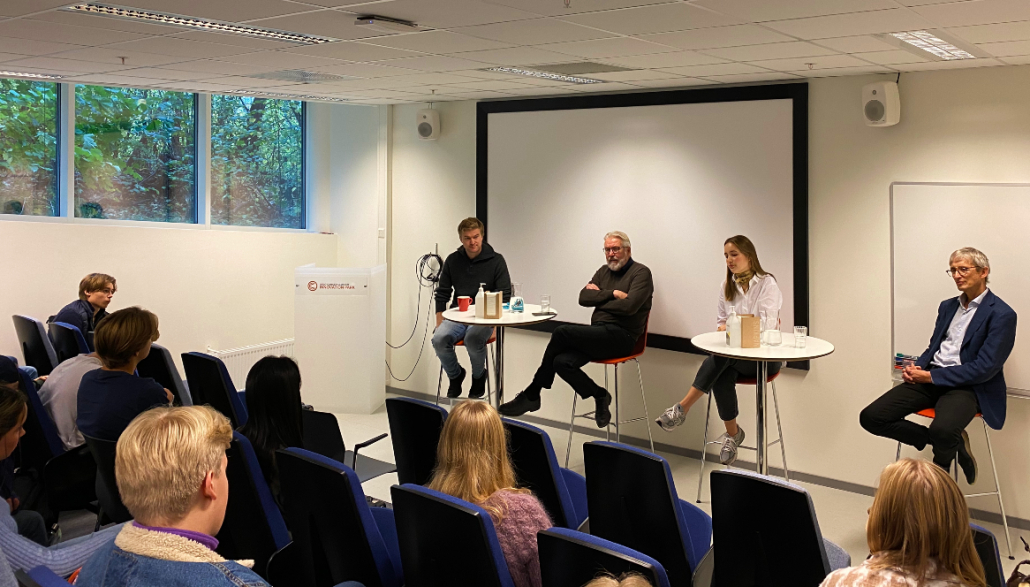
The mentors. From left to right: Vegard, Jónas, Simone and Bjørn. Photo: Elisabeth Kirkeng Andersen.
Fet tells the students that they will meet the four mentors today and twice more during the school year. The next time the visit will take place at one of the mentor’s workplaces. Read more about what the students of the Researcher Programme (2019/2020) experienced when they visited Simone Mester at her workplace in December 2019.
The following time, the students will present their own research to the mentors and receive an evaluation from them. Read more about the type of research the students of the Researcher Programme (2019/2020) presented to their mentors.
“Today you can ask the mentors as many questions you like about their choices concerning education, focus, career, what they have learnt and experienced, and what they are doing today. Please feel free to ask your questions,” Fet says.
Question time
The students are eager to ask their questions to Vegard, Jónas, Simone and Bjørn during the next hour. It is obvious that the students have done some in-depth research on their four mentors.
When the question time was over, Jónas said:
“This was fun! You asked us good and interesting questions. This was both educational and entertaining for me too.”
You can read some of the questions and answers that occurred during the course of the hour they spent together below.
Q&As
Question: What is the most exciting thing you have experienced during your careers?
Vegard:
I was interviewed by NRK radio and they produced an article about our research. The research is about how breathing affects flows in the brain, something that can help to clear the brain from toxins.
An accumulation of toxins in the brain can be associated with an increased risk to develop Alzheimer’s disease, so NRK’s angle was: “Norwegian study: Your breathing can play a part in Alzheimers” even though our research does not say anything about causation. In the comments under the piece, the conclusion was practically “Yoga is good for the brain”, since breathing is an essential part of yoga.
It was interesting to see how our research was communicated so differently from what our work actually was.
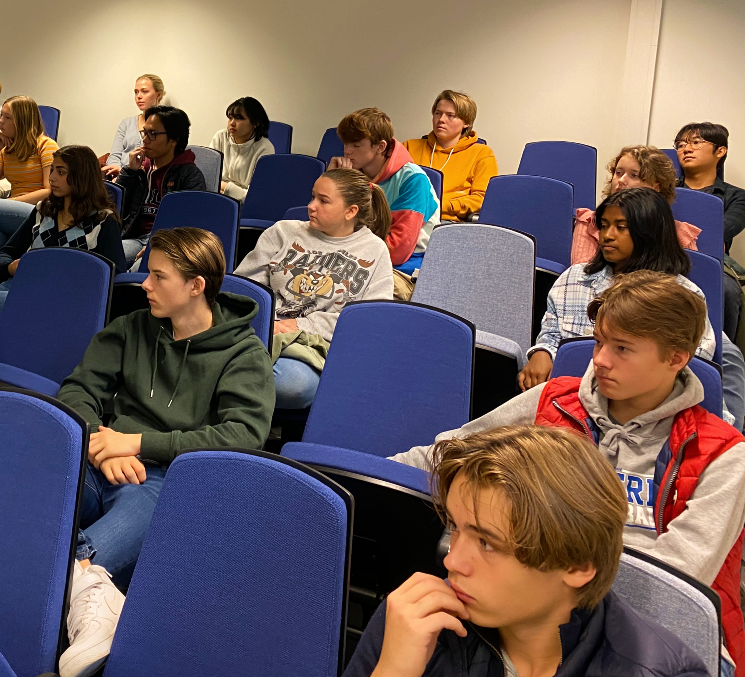
The first-year students of the Researcher Programme listened intently to the mentors’ stories. Photo: Elisabeth Kirkeng Andersen.
Jonas:
My biggest moment was two years ago when I was sitting at a science conference on immunotherapy against cancer in New York. The same day, it was announced that the two researchers Tasuku Honjo and James Allison had been awarded the Nobel Prize in Medicine for their discovery of how checkpoint inhibitors, a form of immunotherapy, can make the body’s own immune system fight cancer.
When the conference opened, Jim – which is James Allison’s nickname – came into the auditorium to give a presentation. This had already been decided long ago and had nothing to do with the Nobel Prize. The whole room stood up and clapped. That was huge. Jim was also here last year and visited the students who are now in the second year of the Researcher Programme.
Simone:
When I was finished with my master I was accepted into SPARK, which is the University of Oslo’s innovation programme. Because of that, I was also invited to Arendalsuka to present my project to many important people, and it was a big thing for me to be able to contribute.
In addition, it is always big when I experience an Eureka! moment in the laboratory: it is fun when you get a result that proves that your theory actually works.
Bjørn:
To find solutions to different things is what I like the most. If I had to choose one individual event, it would have to be this: I had worked for a long time in Photocure as Head of Research, and developed a medical device called Cevira, which is made to treat cervical cancer. We tested it in humans and it had good results, but then it was put on hold for many different reasons.
Then, about one year ago, the news came that a Chinese company had licensed this product for billions of NOK. They are already underway with the last part of the testing of Cevira, so maybe it will enter the market and be used by women all over the world in only a few years. I knew this product would work, so it is fun it is no longer forgotten about.
Question: Where do you think your research careers will take you, Simone and Vegard?
Vegard:
I dream about finding out more about the different flows in the brain that I am doing research on, but I am not sure I will find the answers. It is a simple transition between research and private industry, so maybe I will start my own company in time.
Simone:
I really want to start my own company and it is scary to even say it, but I am already underway. To start a company and develop a pharmaceutical that can make a difference for patients would be fun. I think it is a very exciting and challenging journey, and I am lucky to have guides that help me to do this.
Question: Why are you working with what you are doing now?
Vegard:
When I think back, it seems completely random. I did not have a plan about what I wanted to become when I attended upper secondary school. I liked maths and physics, and got an education in that, which was really fun. When I completed my bachelor degree, I got a summer job at Simula. This was in 2013 and after that, they have continued to offer me work and research projects.
Jónas:
I am a doctor by education and worked for many years as a general practitioner in Western Norway. When I moved from Western Norway to Oslo because of family, I did not have any job to go to and I did not know what I wanted to do either. A friend of mine worked at the Radium Hospital’s Research Foundation and offered me a project-based position for six months so that I could have time to think about the future, and since then I have remained.
Bjørn:
I do not think it is completely random, even if Vegard and Jónas say so, but it seems like that for me too. I studied pharmacy and later I was hired into Photocure and afterwards, I ended up here in the Incubator. But it isn’t completely random. We are affected by our surroundings: just think about what you do here at Ullern and what you are exposed to in the Oslo Cancer Cluster Innovation Park. Even if things seem random sometimes, they are not.
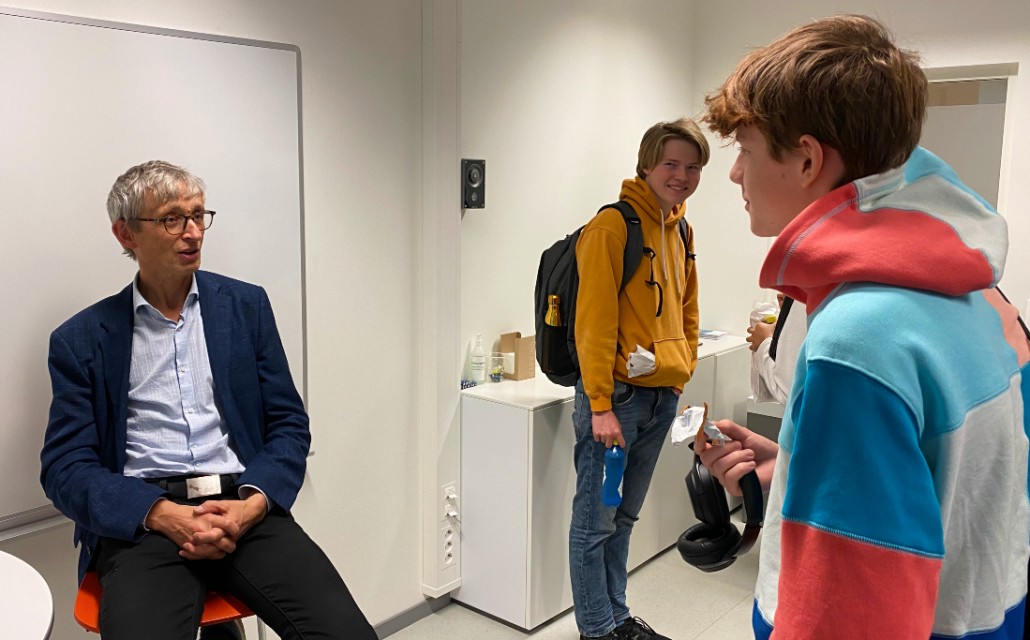
Bjørn Klem tells the students about his background as a pharmacist. Photo: Elisabeth Kirkeng Andersen.
Jónas:
What you are talking about, Bjørn, is called Serendipity and is a type of unplanned discovery or a positive surprise when looking for something else.
For example, I was a rascal during upper secondary school and I wanted to study medicine, but my grades were not nearly good enough for that. So one day, my brother who was the president of ANSA, the association for Norwegian students who study abroad, called me. He told me that all Icelandic people are accepted to the first year of medical school in Iceland, and since I am an Icelandic citizen, that became my way in. That is typical serendipity.
Simone:
I studied science at Ullern Upper Secondary School and thought medicine would be a safe choice. But I wasn’t really interested of patient care, which made me very unsure. I talked a lot with Ragni, who was my biology teacher, and she encouraged me to study molecular biology at the university.
I was lost and confused the first year, because I wanted to study and work with something that has a value and is of use to others: to make a difference. Luckily, I found the research group led by Jan Terje Andersen and Inger Sandlie, where I have received a lot of support to go my own way and be innovative.
By the way, Inger Sandlie is my role model as a researcher and innovator. She has the most innovations registered with Inven2, the tech transfer office of the University of Oslo and Oslo University Hospital, and is behind Vaccibody, that recently entered Norway’s largest agreement in biotechnology.

Simone and Ragni. Ragni Fet, a former cancer researcher and now biology teacher at Ullern was crucial in Simone’s decision to study molecular biology. Photo: Elisabeth Kirkeng Andersen.
Articles about previous mentor meetings
- October 2019: Meet the mentors
- December 2019: Mentor meeting with Mester
- June 2020: Ullern students presented their own research

